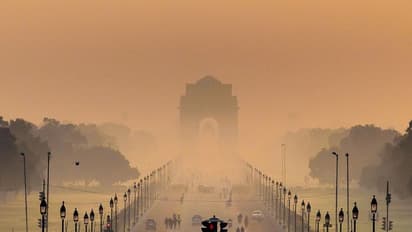Stage 1 of Delhi's anti-pollution plan enforced: Here's What to expect

Synopsis
To address the growing pollution, Stage 1 of the GRAP focuses on key measures to curb dust and pollution sources, including stricter controls at construction sites, enhanced waste management, and increased road cleaning.
In response to worsening air quality in the national capital, the first stage of the Graded Response Action Plan (GRAP) was implemented on Tuesday. The move comes as Delhi's air quality remains in the 'poor' category for the third consecutive day, with pollution levels rising post-Dussehra.
The Central Pollution Control Board (CPCB) recorded an Air Quality Index (AQI) of 207 on Tuesday morning, which falls in the 'poor' range. To address the growing pollution, Stage 1 of the GRAP focuses on key measures to curb dust and pollution sources, including stricter controls at construction sites, enhanced waste management, and increased road cleaning.
Complete lockdown in Pakistan for SCO Summit? Weddings, hotels facing severe restrictions
Delhi's air quality has steadily deteriorated as winter approaches, making it necessary to activate GRAP's first stage. The weather in the city has also contributed to the current pollution levels. According to the India Meteorological Department (IMD), the minimum temperature on Tuesday morning dropped to 17.4 degrees Celsius, two degrees below normal, with humidity at 64 percent. The IMD forecasts cloudy skies for the day, with the maximum temperature likely to reach 35 degrees Celsius.
The AQI scale categorizes air quality from 'good' to 'severe,' with an AQI between 201-300 classified as 'poor.' The rising pollution levels highlight the urgent need for action to prevent further deterioration, especially as winter smog looms over the capital.
IMD issues yellow alert in Maharashtra: Thunderstorms, heavy rainfall expected
Key measures under stage 1 of GRAP:
- The implementation of GRAP's first stage brings several restrictions aimed at reducing pollution levels across Delhi. Some of the primary actions include:
- Dust Control: Strict dust management at construction sites and enhanced waste disposal practices to minimize airborne particles.
- Road Cleaning: Regular mechanised road sweeping and frequent water sprinkling on roads to reduce dust and pollutants.
- Traffic and Emission Control: Tighter monitoring of polluting vehicles, improved traffic management, and stricter emission controls for industries, power plants, and brick kilns.
- Waste Burning Prohibition: Open waste burning is banned, and the use of diesel generators is restricted. The use of coal or firewood in eateries is also prohibited.
- Public Involvement: Citizens are encouraged to report pollution-related complaints through various apps, including the 311 APP, Green Delhi App, and SAMEER App.
- Eco-Friendly Celebrations: An advisory has been issued promoting eco-friendly festivities, with a strong appeal to avoid firecrackers during celebrations.
Stay updated with the Breaking News Today and Latest News from across India and around the world. Get real-time updates, in-depth analysis, and comprehensive coverage of India News, World News, Indian Defence News, Kerala News, and Karnataka News. From politics to current affairs, follow every major story as it unfolds. Get real-time updates from IMD on major cities weather forecasts, including Rain alerts, Cyclone warnings, and temperature trends. Download the Asianet News Official App from the Android Play Store and iPhone App Store for accurate and timely news updates anytime, anywhere.